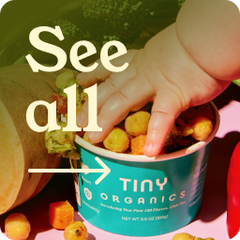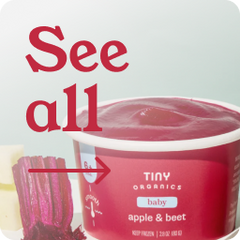How Much Milk Does a Newborn Need?

It’s a common question new parents have - how much milk should your baby be drinking every day? You want to be sure you’re getting your brand new little one all the nutrition they need from their first week of life up to six months from milk or formula alone.
This guide will help you to understand how much milk or formula a newborn needs to grow strong and healthy.
How Many Ounces of Milk Should a Newborn Drink?
Every baby is different - they have varied eating patterns and hunger levels. In general, it’s best to let your baby lead with hunger cues. They are good at telling you how hungry they are, and feeding until they’re full.
Of course, for babies born prematurely or with some medical conditions, you will need to monitor their intake more closely, and your pediatrician is the best person to advise you on how to ensure your baby is eating enough in those cases.
But there are some general guidelines that can be helpful for parents of newborns.
- Generally, a newborn baby will eat every two to three hours (8-12 times every day). In the first day or two of your baby’s life, he might only consume a half-ounce per feeding. But after those first few days, they will probably be drinking around one to two ounces at each feeding.
- By the time your baby is two weeks old, they will likely be drinking around two to three ounces per feeding.
- When they are two months old, they will typically take in around four or five ounces per feeding, and feed every three to four hours.
- At four months old, they will drink about four to six ounces of milk in each feeding.
- At six months, they will take in up to eight ounces of milk per feeding, and feed every four to five hours.
Babies are typically pretty good at eating the right amount. But they might be prone to overfeeding if they’re drinking from a bottle because it takes less effort to drink more than when they’re breastfed.
If your baby is showing signs of overfeeding, such as spitting up, having gas or stomach pains, or vomiting, try offering them a little less the next time they feed. Slowing down feedings can give them the chance to realize their bellies are full before they overfeed and get uncomfortable. Experienced mama tip: if you are bottle feeding, check the nipple size to make sure it is the right stage and size for your baby. If your baby regularly wants to drink more milk even when he’s full, check in with your pediatrician.
What is Colostrum?
Colostrum is a type of highly nutrient-rich breast milk that comes in the first few days of your baby’s life, before your regular milk comes in. It’s very concentrated and contains lots of immune-boosting and protective properties your baby needs in the days after her birth.
Colostrum is typically thick and sticky because it’s so concentrated, and may have a yellow hue because it contains beta-carotene (or it could be orange, white, or clear). It coats your baby’s intestines to protect her from germs, protects her from inflammation, has laxative properties to help get meconium moving, and helps to prevent low blood sugar levels.
A breast-feeding mom’s body usually produces colostrum for several days after your baby is born, and then your milk transitions into regular breast milk. You may even leak colostrum while in the final stages of pregnancy as your body prepares to give birth and feed your baby.
How Much Colostrum Does a Newborn Need?
A new mother produces anywhere from 10 to 100 milliliters of colostrum daily, but most moms average around 30 milliliters (one ounce) per day. And this is just about the amount your baby needs.
If you’re producing less than this, there’s no need to worry - any amount of colostrum is good for your baby and provides those protective properties.
Baby Feeding Chart
Wondering how much milk your newborn baby needs in his first six months of life? This baby feeding chart can help you to estimate your baby’s needs, and it offers guidance for parents who breastfeed and use formula as well.
The CDC also has detailed guidelines about how much and how often to feed your baby that may be helpful. Remember, every baby is different - if you’re concerned about how much your baby is (or isn’t) eating, talk to your pediatrician.




















